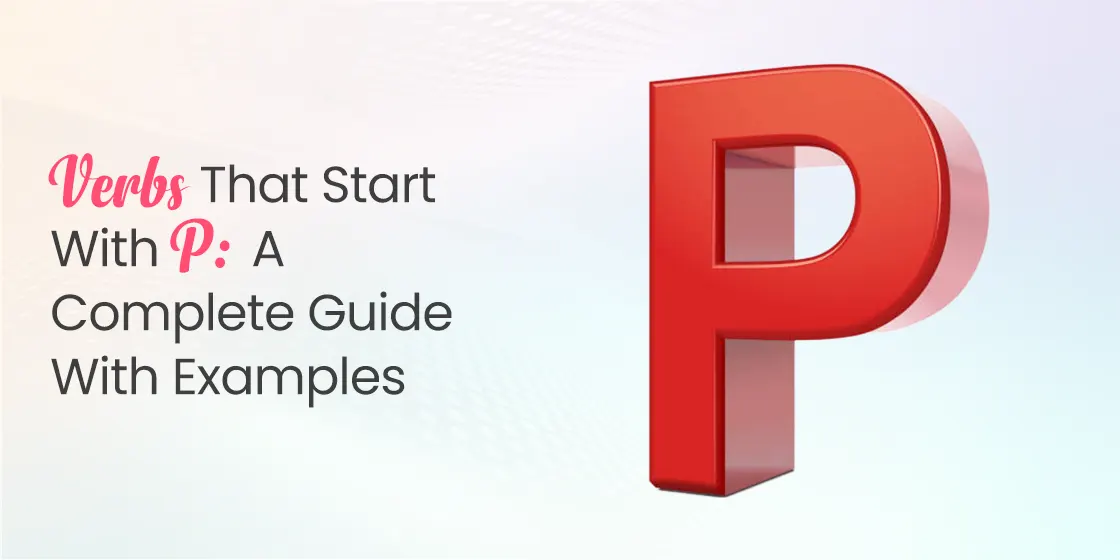Discover How the Top Verbs That Start With P Add a Peculiar Charm To Your Content
Mastering these P-verbs can significantly enhance your vocabulary and communication skills, whether you’re a student, professional writer, or English language learner. These action words provide the energy and movement that bring sentences to life, enabling you to express ideas with precision and clarity.
This comprehensive guide explores the fascinating world of verbs that start with P, organizing them by categories and providing practical examples to help you incorporate them effectively into your speaking and writing. Let’s embark on this linguistic journey and discover how these powerful words can transform your expression, from the lens of a professional web copywriting services agency.
Understanding the Power of P-Verbs
Verbs that start with P represent one of the most diverse and frequently used categories in English vocabulary. These words express actions, states, and processes that are essential for effective communication across all contexts, from casual conversation to academic writing and professional discourse.
The versatility of P-verbs lies in their ability to convey everything from simple physical movements to complex emotional states and abstract concepts. They help speakers and writers create vivid imagery, establish clear relationships between ideas, and maintain reader engagement through dynamic language choices.
According to linguistic research, the letter P appears in approximately 1.9% of English words, making P-verbs relatively common in everyday usage. This frequency emphasizes the importance of understanding these verbs for anyone seeking to improve their English proficiency and communication effectiveness.
Common Daily Action Verbs Starting With P
Daily life is filled with actions that we naturally express using verbs that start with P. These fundamental P-verbs form the backbone of routine communication and help us describe everyday activities with precision and clarity.
Essential Daily P-Verbs:
- Play – to engage in recreational activities
- Push – to apply force to move something away
- Pull – to draw something toward oneself
- Pick – to select or gather something
- Place – to put something in a specific position
- Pass – to go by or hand over something
- Pay – to give money in exchange for goods or services
- Park – to position a vehicle in a designated area
- Pour – to cause liquid to flow from a container
- Prepare – to make ready for use or action
These common P-verbs appear frequently in daily conversations and are essential for describing routine activities. Understanding their proper usage helps create clear, natural-sounding communication that effectively conveys intended meanings.
Positive and Motivational P-Verbs

Positive verbs that start with P inspire action and encourage optimistic thinking. These uplifting words help create motivational messages and promote constructive attitudes in both personal and professional contexts.
Inspiring P-Verbs:
- Persevere – to continue despite difficulties
- Prosper – to succeed and thrive
- Progress – to advance or develop
- Praise – to express approval or admiration
- Promote – to support or advance something
- Protect – to keep safe from harm
- Provide – to supply or make available
- Prevail – to triumph or be victorious
- Pioneer – to be the first to develop or explore
- Perfect – to make flawless or complete
These positive words that start with P serve as powerful tools for motivation and encouragement, helping to create uplifting communications that inspire action and foster positive change in various situations.
Professional and Business P-Verbs
In professional environments, verbs that start with P play crucial roles in describing business activities, management processes, and organizational functions. These specialized terms help communicate complex business concepts with clarity and precision.
Professional P-Verbs:
- Present – to show or display information
- Propose – to suggest or put forward an idea
- Participate – to take part in activities
- Prioritize – to arrange in order of importance
- Process – to handle or deal with systematically
- Produce – to create or manufacture
- Perform – to carry out tasks or duties
- Publish – to make information publicly available
- Purchase – to buy goods or services
- Partner – to work together collaboratively
These professional verbs enable effective communication in workplace settings, helping employees and managers articulate business strategies, project management activities, and organizational objectives with appropriate terminology.
Regular vs. Irregular P-Verbs
Understanding the distinction between regular and irregular verbs that start with P is essential for proper grammar usage. Regular P-verbs follow standard conjugation patterns, while irregular verbs have unique forms that must be memorized.
Regular P-Verbs Examples:
- Play – played, played
- Push – pushed, pushed
- Paint – painted, painted
- Pass – passed, passed
- Pick – picked, picked
- Place – placed, placed
- Pour – poured, poured
- Prepare – prepared, prepared
- Protect – protected, protected
- Provide – provided, provided
Irregular P-Verbs Examples:
- Pay – paid, paid
- Put – put, put
- Prove – proved, proven (or proved)
Most P-verbs follow regular conjugation patterns, making them relatively straightforward to use correctly in different tenses. However, memorizing the irregular forms ensures accurate grammar usage in all contexts.
Academic and Educational P-Verbs

Educational contexts require specific verbs that start with P to describe learning processes, research activities, and academic functions. These verbs help educators and students communicate effectively about various aspects of education and knowledge acquisition.
Academic P-Verbs:
- Publish – to make research findings available
- Present – to deliver academic presentations
- Prove – to demonstrate validity through evidence
- Posit – to put forward as fact or principle
- Ponder – to think about carefully
- Paraphrase – to restate in different words
- Plagiarize – to use someone else’s work without credit
- Participate – to engage in academic activities
- Perceive – to become aware of through senses
- Pursue – to follow a course of study
These academic verbs facilitate precise communication about educational processes, research methodologies, and scholarly activities, enabling clear discussion of complex academic concepts and procedures.
Creative and Artistic P-Verbs
Creative fields utilize specific vivid verbs that start with P to describe artistic processes, creative techniques, and aesthetic experiences. These verbs help artists, writers, and creative professionals communicate about their craft with precision and flair.
Creative P-Verbs:
- Paint – to apply colors to create artwork
- Perform – to execute artistic presentations
- Polish – to refine and improve creative work
- Portray – to represent in artistic form
- Pose – to position for artistic purposes
- Project – to display or present creatively
- Publish – to make creative works available
- Photograph – to capture images artistically
- Produce – to create artistic works
- Preserve – to maintain artistic integrity
These creative verbs provide artists and writers with precise language to describe their techniques, processes, and the effects they wish to achieve, enabling sophisticated discussion of artistic concepts and methods.
Physical Movement and Sports P-Verbs
Physical activities and sports require specific verbs that start with P to describe movements, techniques, and athletic performances. These action-oriented verbs help communicate about physical activities with precision and energy.
Physical P-Verbs:
- Punch – to strike forcefully with the fist
- Pounce – to jump quickly to attack or seize
- Paddle – to propel through water using oars
- Pedal – to operate using foot power
- Pivot – to turn on a central point
- Prance – to move with high, springy steps
- Plunge – to dive or jump forcefully
- Pursue – to chase or follow
- Pound – to strike heavily and repeatedly
- Propel – to drive or push forward
These physical P-verbs enable precise communication about athletic performance, exercise routines, and physical activities, helping coaches, athletes, and fitness enthusiasts discuss techniques with appropriate terminology.
Emotional and Psychological P-Verbs
Verbs that start with P also encompass emotional and psychological states, helping us express feelings, mental processes, and internal experiences. These verbs add depth to emotional communication and help describe complex psychological phenomena.
Emotional P-Verbs:
- Panic – to feel sudden overwhelming fear
- Pity – to feel sorry for someone
- Please – to give satisfaction or enjoyment
- Pout – to show displeasure through expression
- Panic – to experience sudden anxiety
- Pamper – to indulge with excessive care
- Puzzle – to confuse or perplex
- Pressure – to apply stress or urgency
- Provoke – to stimulate or incite reaction
- Pacify – to calm or soothe
These emotional verbs provide nuanced ways to express psychological states and emotional experiences, enabling more precise communication about mental health, relationships, and personal development.
Technical and Scientific P-Verbs
In technical and scientific fields, verbs that start with P describe specialized processes, procedures, and phenomena. These precise terms help professionals communicate complex concepts accurately within their respective domains.
Technical P-Verbs:
- Program – to code computer instructions
- Process – to handle data systematically
- Pulse – to beat rhythmically
- Pressurize – to subject to increased pressure
- Purify – to remove impurities
- Precipitate – to cause something to happen suddenly
- Polarize – to divide into opposing groups
- Polymerize – to combine molecules into chains
- Phosphorescence – to emit light without heat
- Photosynthesis – to convert light into energy
These technical verbs enable precise communication in scientific, engineering, and technological contexts, helping professionals discuss complex processes with the accuracy required for effective collaboration.
Phrasal Verbs Beginning With P
Phrasal verbs that start with P combine the main verb with prepositions or adverbs to create new meanings. These combinations are essential for natural English expression and often carry meanings different from their individual components, such as turning positive words into negative verbs.
Common P-Phrasal Verbs:
- Put up – to accommodate or tolerate
- Pick up – to collect or improve
- Pull off – to accomplish successfully
- Point out – to indicate or mention
- Put off – to postpone or delay
- Pass out – to distribute or faint
- Push through – to persevere despite obstacles
- Pull through – to recover from difficulty
- Put down – to place something or criticize
- Pick out – to choose or select
Understanding these phrasal verbs is crucial for fluent English communication, as they appear frequently in casual conversation and informal writing contexts.
Common Mistakes With P-Verbs
Understanding frequent errors when using verbs that start with P helps improve accuracy and prevents miscommunication. Many mistakes stem from confusion between similar-sounding verbs or incorrect conjugation patterns.
Frequent Mistakes:
- Confusing “passed” (past tense of pass) with “past” (time reference)
- Misusing “practice” (noun) and “practice” (verb in British English)
- Incorrectly conjugating “pay” as “payed” instead of “paid”
- Mixing up “principal” (main) and “principle” (rule)
- Using “affect” instead of “effect” in phrases like “put into effect”
Tips for Avoiding Errors:
- Practice irregular P-verb conjugations regularly
- Learn the specific meanings of similar-sounding verbs
- Use context clues to determine correct usage
- Review common verb patterns and their exceptions
- Consult dictionaries when uncertain about proper forms
Being aware of these common pitfalls helps you use verbs that start with P more effectively and communicate with greater precision and confidence.
Advanced P-Verbs for Sophisticated Expression
Advanced speakers and writers can enhance their expression using sophisticated verbs that start with P. These more complex terms add nuance and precision to communication while demonstrating vocabulary mastery.
Advanced P-Verbs:
- Proliferate – to increase rapidly in number
- Perpetuate – to make something continue indefinitely
- Procrastinate – to delay or postpone action
- Permeate – to spread throughout
- Precipitate – to cause something to happen suddenly
- Predicate – to base something on
- Prevaricate – to speak evasively
- Propitiate – to win favor through appeasement
- Protract – to prolong or extend
These advanced P-verbs enable sophisticated expression and demonstrate mastery of English vocabulary, making them valuable for academic writing, professional communication, and literary expression.
Conclusion
Verbs that start with P represent a powerful and diverse category of words that enhance our ability to communicate effectively across all contexts. From everyday actions to specialized professional terminology, these verbs provide the precision and variety needed for clear, engaging expression.
Mastering verbs that start with P requires understanding their different types, proper usage contexts, and conjugation patterns. Whether you’re writing professionally, studying English, or simply seeking to improve your communication skills, these versatile verbs offer countless opportunities to enhance your language abilities.
The journey of learning P-verbs is ongoing, as language continues to evolve and new applications emerge. By continuing to explore and practice these verbs, you’ll develop greater fluency and confidence in your English communication, enabling you to express yourself with greater precision and impact in all your interactions.
Frequently Asked Questions
| What are the most common verbs that start with P? The most common verbs that start with P include play, push, pull, pick, place, pass, pay, put, prepare, and provide. These verbs appear frequently in everyday conversation and writing across various contexts. They form the foundation for more advanced vocabulary building and are essential for effective English communication in both casual and formal settings. |
| Are there any irregular verbs that start with P? Yes, there are several irregular verbs that start with P, though most P-verbs follow regular conjugation patterns. The main irregular P-verbs include “pay” (paid, paid) and “put” (put, put). The verb “prove” can be either regular (proved, proved) or irregular (proved, proven). These irregular forms must be memorized since they don’t follow the standard “-ed” pattern. |
| How can I remember the different meanings of similar P-verbs? To distinguish between similar P-verbs, focus on context and create memory associations. For example, “passed” is the past tense of “pass” (The car passed the truck), while “past” refers to time (In the past, cars were slower). Practice using these verbs in different sentences and contexts to reinforce their distinct meanings and applications. |
| What are some positive verbs that start with P? Positive verbs that start with P include persevere, prosper, progress, praise, promote, protect, provide, prevail, pioneer, and perfect. These verbs convey constructive actions and positive outcomes, making them valuable for motivational writing, encouraging communication, and expressing growth-oriented concepts in various personal and professional contexts. |
| How do phrasal verbs with P differ from regular P-verbs? Phrasal verbs starting with P combine the main verb with prepositions or adverbs to create new meanings that often differ from the individual components. For example, “put up” doesn’t mean “to place upward” but rather “to tolerate” or “accommodate.” These combinations are essential for natural English expression and must be learned as complete units rather than separate words. |

Unleash your brand story`s potential with eContentSol – your creative writing companion. We craft narratives that captivate. Ready to elevate your content game? Dive into creativity with us and let`s bring your ideas to life.


